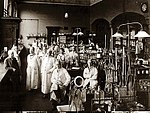Richard Weil (entrepreneur)
Richard Weil (born April 28, 1875 in Ingenheim ( Palatinate ); † 1917 ) was a German pharmacist and entrepreneur .
family
He was the third child of the merchant and landowner Julius Weil (1843–1920) and his wife Juliana Mathilde (1840–1905), née Wolf. His father Julius was also chairman of the Jewish community in Ingenheim and on the board of the Jewish cemetery in his hometown.
On December 6, 1905, Richard Weil married Paula Hochstetter (1885–1970) in Munich. The marriage resulted in two sons in Frankfurt am Main, Edgar (1908–1941) and Hans Joseph (1906–1969).
education
Richard Weil attended elementary school in Ingenheim and in 1885 switched to a higher school in Bad Bergzabern , which he graduated from in 1889 with the final exam. He completed his subsequent studies in 1899 with his doctorate on the subject of the biology of anthrax bacteria .
Military service and war effort
On July 14, 1900, he was registered as a sub-pharmacist of the reserve and on December 19, 1902 he was promoted to chief pharmacist of the reserve. During the First World War he was assigned to the Germersheim hospital and medical unit in this capacity .
Professional development


Until 1902 he worked as an assistant under William Philipps Dunbar at the Hygiene Institute in Hamburg. During this time he wrote various scientific papers, such as "The Spore Formation of Anthrax in Anaerobiosis" (1901) or, together with William Philipps Dunbar, the "Contribution to the Question of Milk Filtration" (1902).
On February 28, 1902, Richard Weil prevailed against a competitor in Frankenthal (Palatinate) and bought the local unicorn pharmacy owned by the Senckenberg pharmacist for 240,000 marks . On June 18, 1902, the Royal Ministry of the Interior gave him the license to run them and subsequently advertised his offers in the local newspaper. However, his competitor, the pharmacist Scharrer, brought legal action against Weil, which led to the revocation of the concession granted to Weil in Scharrer's favor.
After this defeat, Weil moved to Frankfurt am Main and bought the Schwanen pharmacy, the oldest pharmacy in the city, which had been in existence since 1423, at Friedberger Anlage 9, for 600,000 marks . He expanded the pharmacy's laboratory for his production of painkillers, but its area soon became insufficient. Therefore, he founded the Endopharm Frankfurter Arzneimittelabrik in the nearby Grünstraße (most recently Searle-Endopharm in Dreieich ). Serial pharmaceutical production began with Somnacitin , later followed by other preparations such as bronchovydrin , papavydrin and turiopine .
When Weil fell or died in 1917, the family sold the Schwanen-Apotheke after the First World War in 1919 to the pharmacist Heinrich Quittmann and concentrated entirely on their Endopharm company . This developed very successfully. His son Hans Joseph, who worked as a doctor of medicine, carried out his research in the company. With the transfer of power to the National Socialists , the family business was endangered by the " Aryanization " that was carried out . The younger son Edgar, who married Grete Dispeker in 1933, therefore emigrated to the Netherlands in 1933 in order to rebuild Endopharm there or initially to establish a branch. In 1937 the company in Frankfurt am Main was "aryanized". The older son Hans Joseph Weil emigrated to the United States ; his younger brother Edgar was arrested during a raid on the street in the Netherlands in June 1941 and murdered in the Mauthausen concentration camp in September 1941 . After the end of the war, his wife Grete Weil managed to return the company to the family's possession by means of restitution .
Works
- On the biology of anthrax bacteria . Diss. R. Oldenbourg, Munich 1899.
Individual evidence
- ↑ Because, Richard . In: German biography. From: deutsche-biographie.de, accessed on July 22, 2017
- ↑ Because Julius 1843 . From: juedisches-leben-in-ingenheim.de, accessed on July 22, 2017.
- ↑ Because Juliane Mathilde . From: juedisches-leben-in-ingenheim.de, accessed on July 22, 2017.
- ↑ Because Paula . From: juedisches-leben-in-ingenheim.de, accessed on July 22, 2017.
- ↑ Because Edgar . From: juedisches-leben-in-ingenheim.de, accessed on July 22, 2017.
- ↑ Because Hans Joseph . From: juedisches-leben-in-ingenheim.de, accessed on July 22, 2017.
- ↑ Richard Weil: On the biology of the anthrax bacteria . R. Oldenbourg, Munich 1899.
- ↑ Excellent family and social thee for everyday use. Fürsten-Thee per pound net MK 2.-. Sole defeat at Dr. R. Weil, Einhorn-Apotheke Frankenthal . In: Frankenthaler Zeitung, No. 266, November 12, 1902.
- ↑ Frankenthaler Zeitung, No. 12, January 15, 1903
- ↑ Peter Ahrendt: A bad hater. On the 10th year of the death of the writer Grete Weil. In: Glarean Magazine. July 25, 2009. from: glareanverlag.wordpress.com , accessed July 15, 2017.
- ↑ Grete Weil - uncomfortable, compelling to think . In: Exile Research: An International Yearbook. Volume 11, 1993, pp. 156-170.
| personal data | |
|---|---|
| SURNAME | Because, Richard |
| BRIEF DESCRIPTION | German pharmacist and entrepreneur |
| DATE OF BIRTH | April 28, 1875 |
| PLACE OF BIRTH | Ingenheim |
| DATE OF DEATH | 1917 |